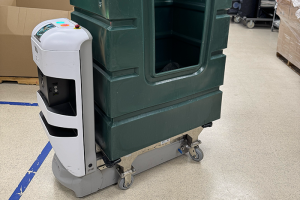CDC project will tackle hand-hygiene education
The Centers for Disease Control and Prevention (CDC) is partnering with hand sanitizer manufacturer GOJO Industries to produce and distribute unbranded hand-hygiene educational materials and tools for patients, health care providers and caregivers in U.S. health care facilities.
The collaboration is part of the Safe Healthcare Initiative, a partnership program coordinated by the CDC’s Division of Healthcare Quality Promotion and the CDC Foundation to eliminate healthcare-associated infections (HAIs). The project is still in the early stages of developing the materials — which likely will include print, video and other types of media — and will be available this summer. A communications officer with the CDC Foundation says it has worked with GOJO on a previous project and approached the company to help it update its hand-hygiene educational materials.
“We know the single most important measure to reduce health care-associated infections is effective hand hygiene,” says Joe Kanfer, chairman and CEO of GOJO. “Hand washing and hand sanitizing are primary infection prevention actions that health care workers take to overcome the challenge of HAIs, reduce the need for antibiotics and combat antibiotic resistance. We look forward to working with the CDC so that, together, we can improve awareness of — and advance the science of — hand hygiene and its importance in improving public health.”
The CDC states that there were an estimated 722,000 HAIs in U.S. acute care hospitals in 2011 and, on any given day, one in 25 hospital patients has at least one HAI. Each year in the United States, an estimated 2 million people become infected with antibiotic-resistant bacteria and at least 23,000 people die as a direct result of these infections. Additionally, many people die from other conditions complicated by an antibiotic-resistant infection, according to the CDC
The purpose of this new initiative is to improve hand-hygiene practices in all health care settings, including hospitals, nursing homes and ambulatory care environments. Preventing infections through strong infection control, including hand washing with soap and water and using alcohol-based hand sanitizers, can prevent patients from getting infections that require antibiotics.
CDC hand-hygiene recommendations include having health care providers practice hand hygiene at key points to disrupt the transmission of microorganisms to patients, visitors and health care workers. It also notes that patients and their loved ones can play a role in helping to prevent infections by practicing good hand hygiene themselves as well as asking or reminding their health care providers to perform proper hand hygiene.
In addition to the Safe Healthcare Initiative, other CDC Foundation efforts include the Preventing Infections in Cancer Patients program, the Safe Injection Practices Coalition, patient tools for antibiotic stewardship programs and analyzing antibiotic use in U.S. health care settings.



